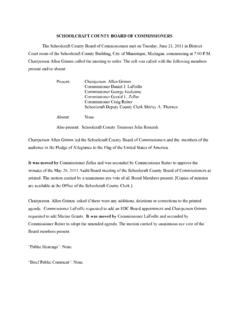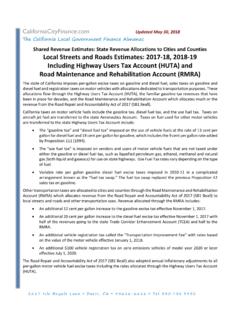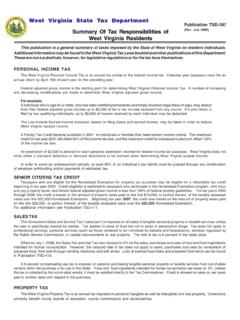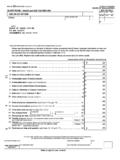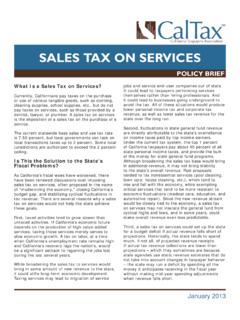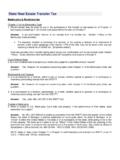Transcription of TAX EQUALIZATION - Schoolcraft County, Michigan
1 TAX EQUALIZATION : Courthouse 300 Walnut Street Manistique, MI 49854. (906)341-3677. Paul D. Wood, Director Ronald I. Pawley, Appraiser Marilyn S. Benish, Secretary We are your passport agent for Schoolcraft County. PASSPORTS. Requirements to apply for Passport: Proof of Citizenship (Certified Copy of Birth Record, Previous Passport, or Naturalization Record). Valid Driver's License Two Identical Passport Photos (Can be taken at County Clerk's Office). Standard Processing is 5-6 Weeks Fees: $ for Passport Book (16 and over) Must be Cash, Check or Money Order $ for Passport Book (under 16) Must be Cash, Check or Money Order $ (expedite fee if needed in less than 6 weeks) Must be Cash, Check or Money Order $ for Passport Card (16 and over) Must be Cash, Check or Money Order $ for Passport Card (under 16) Must be Cash, Check or Money Order -Additional $ for mailing of expedited requests.
2 $ (Certified Copy of Birth Record if needed). $ Passport Photos Apply in person unless your application is a renewal (less than 15 years from the Apply in person unless your application is a renewal (less than 15 years from the date of issue). If the person is under 14 years of age both parents must be present along with the child. If the person is a minor, 14 or older, one parent must be present with the child. Renewal by mail: Adult- $ Minor-$ -Check with Department of State to see if you are eligible for renewal by mail, or to obtain your passport application online at; Frequently Asked Questions: Q: My tax bills are calculated based on taxable value instead of state equalized value. What does taxable value mean to me? A. Taxable values began in 1995 as part of Proposal Taxable values are adjusted each year by the Consumer Price Index (CPI) or 5%.)
3 Whichever is less until property title transfer. Your taxable value cannot be greater than your state equalized value. In other words, Proposal A. capped taxable value increases by the CPI or 5% whichever is less. Q: Can my taxable value increase more than the rate of inflation? Yes, if: A. A sale and/or title transfer occurs. In the year following a sale and/or title transfer, the property becomes uncapped making the state equalized value (SEV) and taxable value the same. Michigan law states the actual sale price must not be the sole basis for the new SEV for that property. A. New construction to a property is added to the taxable value. A. The value of items omitted from the previous year(s) assessed value is added to the taxable value. Q: If my taxes are not based on taxable value, why is there an assessed value? A.
4 The Michigan Constitution still requires all properties to be assessed annually at 50% of market value. Q: How was my assessed value determined? A. Assessors use a state required mass appraisal method to value properties. We estimate land values from sales data and building values from a state cost manual. Then, we analyze sales data from your neighborhood and develop factors we use to further adjust our estimates to reflect local market value. Q: I haven't made any improvements to my house. Why did my assessed value change? A. Your market value can change even when there is no physical change to your property. A growing economy or increasing population can push housing values steadily upward. The Assessor does not create increases in property value. He/she recognizes changes as they occur and must adjust values accordingly.
5 Q: Why is my change in assessed value different than my neighbor's? A. Assessed value changes vary according to the individual characteristics of houses in relation to sales in your area. Building style, size and amenities such as porches, decks, garages, and extra bathrooms affect value estimates. Q: My assessed value didn't change, but my taxable value increased. Why? A. The current sales information for your neighborhood may show no value increase over last year's value. However, the taxable value is tied to the Consumer Price Index and calculated annually causing an increase in your taxable value. Q: How do I know if my assessed value is reasonable? A. Compare the market value of your property with sales of similar homes in your neighborhood. The sales should be on homes that are similar to yours in size, style, age and condition.
6 The Assessor's Office has sales information to assist you. (Assessed Value = 1/2 of Market Value). Q: I just bought a new house, why isn't my assessed value one half of my sale price? A. Michigan law prohibits assessors from basing values on one sale price. We are required to value your property based on the methods used to value other properties in your area. While we hope our value estimate is close to your sale price, it is an estimate and may not be the same as your recent sale. Q: What if I disagree with the assessed value on my property? A. Appeals are heard each year at the March Board of Review, either by letter or in person. This step preserves your appeal rights for further action at Michigan Tax Tribunal. Q: What is a property transfer affidavit? A. Changes in state law after Proposal A created the property transfer affidavit.
7 An affidavit must be filed whenever title of real estate or buildings on leased land is transferred. It must be filed even if you are not recording a deed. Filing with the local assessor is mandatory. Q: Where do I obtain and file the affidavit? A. Property transfer affidavits can be obtained from closing agents such as a title office, financial institution or attorney. They can also be obtained at your local assessor's office. The new owner must file the affidavit with the local assessor within 45 days of the transfer. Q: What is the purpose of the affidavit? A. Assessors use the affidavit to make sure that property is assessed properly and receives the correct taxable value. Q: What is a transfer of ownership ? A. State law defines a transfer of ownership as the conveyance of title to or from one person or entity to another, including the beneficial use of the property.
8 Transfers include deeds, land contracts, and a variety of transactions outlined on the back of the affidavit form. Q: What happens after ownership of a property is transferred? A. The Michigan Constitution limits how much a property's taxable value can increase while owned by the same person. Once the property is transferred, the assessor must change the taxable value to 50% of the property's usual selling price. In other words, in the year following the sale the taxable value equals the current state equalized value. Q: Are certain types of transfers exempt from adjustment? A. YES. Some of the exempt transactions include changes in ownership solely to exclude or include a spouse, transferring a property into a trust where the sole beneficiary is the creator of the trust or that person's spouse, redemption from a tax sale, or transfer to effect a foreclosure.
9 Some of the exempt transactions are listed on the affidavit form and full descriptions are in MCL Section (7)(a-m). Q: What is the Principal Residence (Homestead). exemption? A. State law grants a Principal Residence (Homestead) exemption from local school operating taxes for Principal Residence (Homestead). and Qualified Agricultural properties. Currently this is a reduction of 18. mills of school tax. Q: How do I qualify for the exemption? A. To qualify you must own the property and occupy it as your legal, primary residence. The deadline to qualify for any given year is December 31st of that year. Buyers who close and/or occupy the residence after that date are eligible for exemption in the following year. Q: What form do I use? A. If this is your first Principal Residence (Homestead) application or you are buying a property that was not previously homesteaded, you can use the Affidavit for Principal Residence (Homestead) Exemption (2368).
10 After 2004, the form will be called the Affidavit for Principal Residence Exemption to avoid confusion with the Homestead Property Tax Credit available when filing your Michigan income tax return. Q: What if I stop using my Principal Residence (Homestead) as my primary residence? A. If you stop using your exempt property as your principal residence but are not selling it, you are required to file a Request to Rescind Principal Residence (Homestead) Exemption (2602). This form must be filed within 90 days of the change. The exemption remains in effect through December 31 of that year. Q: What if I sell my house and buy a new one? A. You need to rescind the Principal Residence (Homestead) on the house you sold and request a Principal Residence (Homestead) on your new house. Use a Request to Rescind Principal Residence (Homestead).
